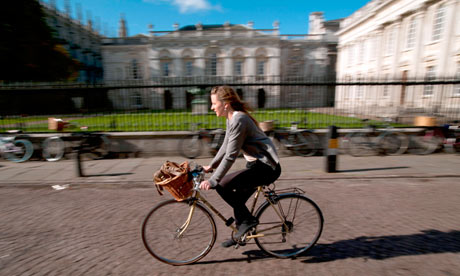Iraq was a huge blow to the moral and international standing of this country. It changed, probably permanently, the relationship between the people of Britain and their leaders. I, for one, can never see our government – or our feeble democratic institutions, which did so little to prevent the disaster – in quite the same light again.
But, less widely understood, Iraq was also a military humiliation for the UK. In the debacle that was the war, and above all the occupation which followed, one group of people – Britain’s military leadership — got off far too lightly. And because we never faced up to this, the humiliation continues, right now, in Afghanistan and in Whitehall. One cherished part of the country’s self-image – the power and reputation of our armed forces — is now at serious risk.
For years, the top brass has been essentially exempt from the kind of criticism dished out to other public-sector leaders. All the failings of Iraq and Afghanistan are blamed on conniving politicians or cheese-paring bureaucrats. But evidence from those conflicts shows some of our generals, admirals and air marshals to be rather too much like, say, NHS managers for comfort.
Iraq’s greatest disaster was not the deceit beforehand, or the brief phase of “major combat operations” which began 10 years ago next week. It was the occupation which followed. That was when the vast majority of victims — perhaps 190,000 of them – died. If the occupation had gone better, the politicians’ lies would have been forgiven by now. And it was during the occupation that Britain’s brass fell down on the job.
The key evidence is hundreds of pages of official interviews, conducted by the Army itself with those in charge of the operation. A full set of classified transcripts, leaked to The Sunday Telegraph in 2009, painted a disturbing picture of complacency and misjudgment at senior levels.
Major-General Graeme Lamb, commander of 3 Division in the first months of the occupation, told his interlocutors: “It is easy to become fixated by the enemy. Securing military victory over the enemy is probably not a reality.”
Instead, Lamb favoured “soft effects,” such as improving the lives of the local people, which “really wasn’t that difficult and didn’t require that many experts. Once you knew what you needed to do, you then dispatched the nearest captain with the 'find me 100 trucks’ order and it all worked.”
With apologies to Lamb — who went on to high command in Afghanistan — the enemy surely was quite important. And sending out a captain with a hundred trucks did not “all work”. Basra’s infrastructure remained in ruins, partly because there were not “that many experts” — indeed any at all – and because security was never satisfactorily tackled by the British.
Instead, the British preferred to make deals with the enemy, the Iranian-backed Mahdi Army militia commanded by Muqtada Sadr. In the classified interviews, Major-General Andrew Stewart, the overall British commander, described how he “evaded” and “refused” American orders to confront Sadr, saying: “I was trying to achieve the same result through different means – trying to neutralise Sadr through the use of local Iraqis and succeeding.”
He did not succeed. Sadr was not a solution to the insecurity, but its key source. By 2006, Basra was in anarchy. By the following year, the policy of negotiation had led Britain to what was essentially a surrender. To the intense frustration of many British officers, we secretly signed a deal that we would not enter Basra in return for a promise that Sadr’s forces would stop attacking us.
It kept the body count down, which was all that mattered in London. But it also abandoned Basra to the Mahdi Army, who swaggered through the streets closing down video shops and enforcing headscarves on women.
The tragedy — as many of the classified interviewees recognised – was that Britain’s part of Iraq, the Shia south, was not like the centre of the country. Brutalised by Saddam, Iraqi Shias supported the invasion and might have been prepared to back the occupation. But Britain’s failure to improve infrastructure and security alienated them.
It is true that, by the time we left, the situation in Basra had dramatically improved. But that was due to an Iraqi- and US-led military offensive, Charge of the Knights, in which we took virtually no part.
Constrained by their surrender agreement, the British, theoretical guardians of Basra, stayed in their secure base on the outskirts until the closing moments, as the Iraqis and Americans drove the Mahdi Army out of town. By that stage, such was both nations’ contempt for Britain that they didn’t even tell us they were coming until the last minute.
Of course, you could say that without enough troops, and without enough political commitment, the British Army made the only choice it could. That is one of the reasons why Mr Blair’s deceits beforehand ended up mattering so much: because he could not admit he was planning a war, the forces could not prepare properly for either it or the aftermath. And afterwards, public disgust at the lies sapped will to resource the occupation.
As it happens, the military leadership was culpable there, too. In the run-up to the war, top-level figures in the defence establishment privately told journalists, including me, of their scepticism that Saddam was a serious threat. None was ever prepared to go on the record. Only in their memoirs — or at the Chilcot inquiry, when a stampede of brass wore out the carpets to dump on Blair – did the public learn of these brave warriors’ doubts.
Nor, with one or two exceptions, did they speak out against the years of disastrous procurement and kit that contributed to Britain’s Basra reckoning. Some soldiers only had five rounds of ammunition. The very first British casualty of the war, Sergeant Steven Roberts, died because his unit didn’t have enough body armour.
 Sergeant Steven Roberts from Bradford, West Yorkshire, who was the first British armed forces personnel to be killed in the Gulf War in 2003.
Sergeant Steven Roberts from Bradford, West Yorkshire, who was the first British armed forces personnel to be killed in the Gulf War in 2003.
Underlying the failed Basra strategy, too, was a flawed British assumption that they were good at counter-insurgency. We understand the natives, the generals would tell you — unlike those brutal, clumsy Americans. But smiles and handshakes could never alone have worked. Even previous peace support operations, such as Bosnia, had only been resolved by the use, or threat, of sufficient force.
The Americans were indeed appallingly brutal, to begin with, but they learned, and they changed — and, unlike us, they didn’t give up. They did surge men and resources; and in the end, helped by the overreach of their enemies, they did at least in part prevail. Both countries suffered political humiliation in Iraq. But only Britain was defeated militarily.
The clear lesson from Iraq was that you should do something properly, or not at all. But in Afghanistan, Britain’s generals repeated the same half-baked, penny-packet approach, the same self-delusion about their rapport with the locals, and drew the same contempt from their American allies.
General Benjamin Freakley, the main US commander in southern and eastern Afghanistan at the beginning of Britain’s campaign, admits that he was “scathing” to the British about their efforts in Helmand province. He said he warned especially strongly against Britain’s “disastrous” tactic of sending small groups of soldiers to far-flung “platoon houses,” sitting ducks for the Taliban. The practice was finally changed, but not before dozens of British lives were needlessly lost. These were operational decisions, nothing to do with British politicians — some of whom, indeed, were aghast at their generals’ recklessness.
The irony of Iraq is that an operation intended to strengthen the Anglo-US “special relationship,” the bar to which the British diplomatic and military establishment so desperately clings, did the exact opposite.
Basra cost us much respect in the Pentagon. In the leaked Iraq interview transcripts, the British brass complain that the overall US commander, General Rick Sanchez, never visited and never called: he didn’t, they complained, even install a secure phone link with them. Britain’s chief of staff, Colonel JK Tanner, likened the Americans to “a group of Martians”, saying: “Despite our so-called 'special relationship,’ I reckon we were treated no differently to the Portuguese.”
Soon, in Afghanistan, we will declare victory and leave. But it seems unlikely that we will leave much lasting trace of our presence, or much in return for the 440 British lives so far sacrificed there. And unlike the politicians of Iraq, the generals have moved on, reputations unsullied, to more lucrative work.
General Lamb, for instance, has recently taken to the media, extravagantly praising a dictatorial Arab regime which paid his lobbying company £1.5 million to “support [its] stance before the international community”. The Iraq war sandblasted the credibility of the British government, the intelligence agencies, and the diplomatic corps. But with the forces there is still, perhaps, an unwillingness among the media and public to confront reality; still a strong wish to believe that Britain is the best, the undefeated.
But for the sake of the self-respect and the very future of those forces, still among the proudest assets of this country, it is essential that they, and we, face the truth and learn the lessons.






 Sergeant Steven Roberts from Bradford, West Yorkshire, who was the first British armed forces personnel to be killed in the Gulf War in 2003.
Sergeant Steven Roberts from Bradford, West Yorkshire, who was the first British armed forces personnel to be killed in the Gulf War in 2003.